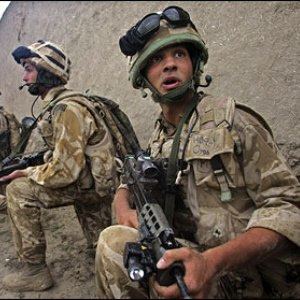What has gone wrong in Afghanistan

On October 7, 2001, the US forces started a massive air and missile campaign against Taliban targets in Kabul and other parts of Afghanistan. The reason for the onslaught was that the Taliban regime did not surrender Osama bin Laden who was accused of masterminding the terrorist attacks of September 11, 2001 in New York and Washington. The US and NATO forces, in coordination with Northern Alliance forces, defeated the Taliban regime after some weeks of heavy fighting and a new government comprising of different elements fighting the fundamental regime came to power.
Last Friday marked the tenth anniversary of the US war in Afghanistan. During these years, the Afghan people while relieved from the tyranny of Taliban regime have suffered a lot under constant atmosphere of insecurity caused by the NATO bombardments as well as terrorist attacks by the Taliban insurgents. The inefficiency and corruption surrounded the Karzai government have also added to the misery of the people.
Almost all Afghans appreciate the fact that they do not live under the Taliban regime anymore. However, they convincingly question the usefulness and effectiveness of the invasion of their country in 2001. During the last ten years, thousands of innocent Afghans have been killed and many others wounded. The country has not yet recuperated following years of war and destruction. The Pentagon has put the number of US soldiers killed in Afghanistan as close to 1800. Stanley Mc Chrystal, the former US commander in Afghanistan said last week that over the last ten years, the United States has only achieved half of its military objectives in that country. He also referred to the US lack of information about Afghanistan at the beginning of the war.
Now the questions is why following years of war imposing heavy material and financial strains on all sides, the situation in Afghanistan is far from normalcy. What has gone wrong? A straightforward answer is not available. However, a number of reasons have been mentioned in this regard. First, lack of knowledge about Afghan society and culture on the part of American officials has definitely attributed to the lack of success for the United States. Second, starting another war in Iraq in just two years into the Afghan war has not only put pressure on American military and resources to cover two heavy and costly wars simultaneously; it has also created an image of the US in the Muslim world as fighting only Muslims while Israel has continuously committed aggression against Palestinians. Third, ignoring regional mechanism and the potentials of the neighboring countries to find a solution to the Afghan problem has also been responsible for the American failure in that country.
The US has, for some time, capitalized on working with the so-called moderate elements of Taliban. The aim has been to create a division between "good Taliban" and "bad Taliban". This policy, stemming from lack of US knowledge about Afghanistan and the region in general, has proved to be wrong on past occasions and more recently by the assassination of Burhanuddin Rabbani, a former president and peace envoy of Karzai, by the Taliban.
Barrack Obama has announced that by 2014 the US forces will leave Afghanistan. This is good news for overwhelming majority of Afghans who believe that NATO forces have not done a good job in their country. Whether the US will keep its promise to leave Afghanistan by that time is not clear. The important point is what steps the United States wishes to take in the next three years. If the same failed strategy is going to be pursued, one cannot expect to see peace and tranquility established in Afghanistan. If the Americans are prepared to accept the realities of the region, then one can hope that with working with all segments of Afghan society and through a regional mechanism, peace and security can again return to Afghanistan.

